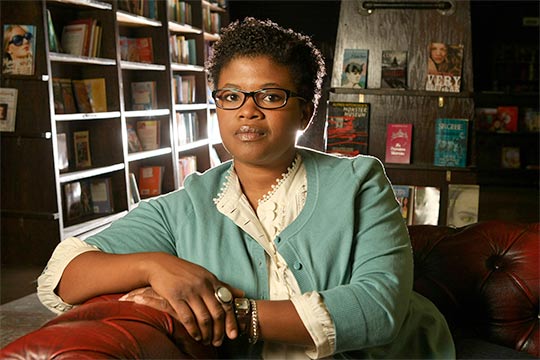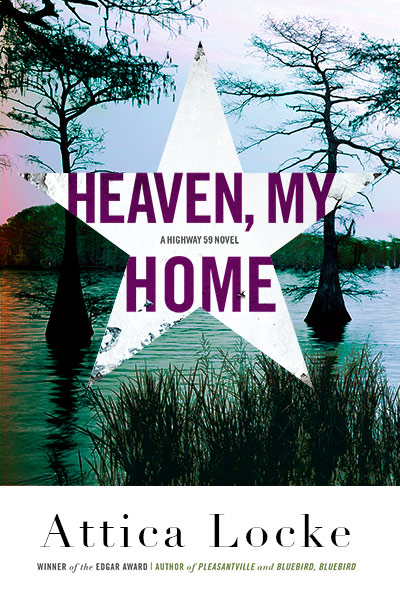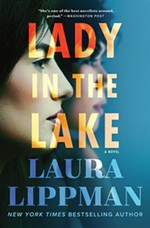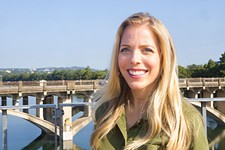Attica Locke on Solving Crime on Highway 59
Heaven, My Home author talks her East Texas roots and the blues
By Robert Faires, 6:09PM, Fri. Oct. 25, 2019
"Darren had never seen anything like it. Cypress trees, their trunks skirted like shy dancers at a church social, leaving enough space for God between them, … so many trees shooting up to a sky that was darkening after all, … That or the canopy of Spanish moss hanging from the trees had steepled the forest, had put a roof over this holy sanctuary on water."
That's Caddo Lake, and that's the kind of description that could only come from someone who's experienced its grandeur and mysteries firsthand. Which Attica Locke has. The great serpentine body of water that curls across northeast Texas and northwestern Louisiana is one of several spots in East Texas that made a big impression on the Houston native growing up and that she's now made a setting in her crime fiction series set along Highway 59.

The series centers on Darren Matthews, a black Texas Ranger whose cases pull him up from Houston – Locke's hometown – into the small towns and Piney Woods and cypress swamps along that ribbon of asphalt. Bluebird, Bluebird, which launched the series last year, won an Edgar Award, and Locke has just released a sequel, Heaven, My Home, which sends Darren to Caddo Lake on a search for a missing 9-year-old boy – and not insignificantly, a white boy. In the investigations he tackles, Darren invariably runs up against entrenched East Texas racism, most often in the form of the Aryan Brotherhood of Texas, to which the missing boy's father may well have ties.
Heaven, My Home, like Bluebird, Bluebird, is an absorbing mystery enriched by its tarnished knight of a protagonist, its arresting evocation of East Texas, its complex comprehension of race relations there and how it portrays them, and a strain of the blues that sounds on every page. Locke may be better known for her work on the television series Empire, but the Highway 59 series are proof that books are the medium she was born for.
Locke recently found time to talk with the Chronicle about the new book, her family ties to Highway 59, her research trip to Caddo Lake, and how the blues figures into everything.
Austin Chronicle:I found your acknowledgments at the end of the book to be affecting, especially what you said about your family, about how much of the series is rooted in your family and how they’ve helped you. I know every novel is personal to some degree, but there’s something so clearly intimate about these books and you. Could you talk about how you came to write this series?
Attica Locke: Well, it’s what you’re talking about, which is my profound love for and the deep connection I feel to East Texas. My whole life, I’ve kind of, I don’t want to say taken for granted but kind of taken for granted my Texan-ness. But the older I’ve gotten, the more I’ve come to appreciate the values that I was raised with and to see their connection to my very agrarian ancestors’ lives. Meaning I come from people on both sides of the family from along [Highway] 59. Both my mom’s side and my dad’s side. My mom’s mom’s side and my mom’s dad’s side. Everybody comes from these tiny towns in East Texas along 59. And everybody was farmers, so there was a sense that [with] hard work and fortitude and vision and a sense of ballsiness, you could, after Reconstruction, stay in Texas and make a life. It took me a while to deeply appreciate that these are the values that I cherish and that they come from the fundamental Texas-ness and East Texas-ness of my family. And there was a part of me that wanted to write a series that honored that, that showcased that, that let the world know there are black Texans, too, you know, it’s not just the kind of cowboy/John Wayne image. There are black folks in the South and black folks in Texas who claim all of this Texas culture, too, even if they might have ambivalence about the political history of the state. So it was just love, love, love, love of East Texas that sparked the idea to do this series.
AC: I love that, and I loved that on the cover of Heaven, My Home, it's called “A Highway 59 Novel.” I have East Texas roots myself. Pretty much all of my family on both my parents’ sides come from Northeast Texas, so when I read Bluebird, Bluebird, all of it made so much sense: the land, the people, the settings, the racism – all of it hit really close to home. That’s part of why I was so excited to read this book and see that your connection to it isn’t just to the character; it’s to the place and the history.
AL: Very much so.
AC: And speaking of place: Caddo Lake!
AL: Hahahahaha!
AC: That’s some scary territory.
AL: It is! And I knew that I was gonna write about Caddo Lake before I had a story. You know, when I conceived of this series, all these towns popped into my head. “Oh, you could do a story here. You could do a story there.” And I knew there would be a book in Caddo Lake. I had no story. It’s just, you know, something you kinda have to write about.
AC: How familiar were you with the Caddo Indians and that history of the area?
AL: Not very at all. I did a lot of research and a lot of like dropping into my heart, meaning there are these names that we just kind of take for granted all over the country. Practically all of Oklahoma is Native American names. You know, there’s all kinds of places in Texas with Native American names, and after a while, you don’t think of it. You think of Caddo Lake and you just think, “Oh, yeah, there’s some AirB&Bs out there and there’s the Big Pines Lodge, and there’s this and there’s that.” I tried to make my brain leave all of that out and remember “Where did this come from?” And I didn’t understand that the name of the state came from Caddo Indians. When I knew that, my whole heart, my whole mind, just kind of blew wide open. So I feel like my heart knew more about the Caddos before I had the actual information, and then I did a ton of research.

AC: Caddo Lake is so vivid in the book, and it feels so true to that space. The acknowledgments mention you going back out there for research. Tell me a little about your stay out there.
AL: Well, I was full of nerves. I was quite afraid to stay out there by myself. If you just look at those images and you think about a woman – or, frankly, to me, anybody – that you would stay in a cabin out there? At night? By yourself? No! I’m never gonna do that! Never. I would’ve done it if I had to, but I asked my daddy, “Would you please please please come with me?” And he thought it was a lark, so he was like, “Sure! Why not?” And he came with me, and it turned out to be a fantastic father-daughter trip that I think he and I will remember forever. When you get older with your parents, you know, you see each other at Christmas and Thanksgiving, but there’s not a lot of “We’re meeting in the middle of March for no good reason, and it’s just us.”
AC: “And let’s go to Caddo Lake.”
AL: “And ride on a boat and do all this stuff.” Yeah, yeah, exactly. We had a great time, and, you know, I found the place to be less scary than I thought. I was imagining, I’d been reading all these books about it and all the history of it, and all these ne’er-do-wells used to hide out there and there were shootouts and all this kind of crazy stuff, so I was imagining outlaw culture. It’s not so much that as it is the people who live there, they’re not vacationers. People who live there are very much live-and-let-live. “We’re doing’ our own thing. You do your own thing. If our own things don’t bother each other, it’s all good.” So I found a very relaxed attitude out there, frankly.
The only time I got really uncomfortable was one night my dad and I, we got lost. And it was dark and no lights. We had gone to eat at some place in Karnack or sumpin’-sumpin’-sumpin’, and on our way back to our cabin, we made a wrong turn and ended up on some back road with honky tonk, some kind of bar with way too many Harleys in front of it. There’s no reason for that many Harley Davidsons to be in one place in the middle of East Texas and anything good be about to happen. So we were like, “Reverse! Reverse!” That was the only thing that truly, truly scared me. But otherwise, it ended up being a great, great trip. And I was surprised by the warmth of the people there. As you saw in the acknowledgments, somebody paid for my lunch on my last day there. I have no idea who it was or why. No clue.
AC:That’s lovely.
AL: It was so lovely.
AC: Both books feel very much like blues songs. You write so tellingly about the blues and how it lives in Darren as a character. Were the blues a big part of you growing up, or was this also you getting in touch with something that you didn’t realize mattered to you until later in life?
AL: A bit of both. I mean, there has always been blues in my life in terms of my family. My mom, my mom, my mom loves the blues, and in fact I always tease her about, having a very bluesy sense of humor. It’s very tongue in cheek, it’s very sly. It reminds me of the blues. But of course, you know, at family reunions it was just as likely that the Commodores would be playing as Lightnin’ Hopkins. You can’t really dance to Lightnin’ Hopkins. But I knew who he was.
But it is true that as I got older, my appreciation of that music deepened. So that it’s not just that it sounds kinda good, it’s that the stories being told in the songs and the fact that the songs themselves speak to the same values I was talking about earlier: the fortitude and the ballsiness and the things that helped black folks in Texas survive. For most of my adult life, I have listened to Lightnin’ Hopkins religiously, and as a novelist – before I wrote this series, I wrote three other books before this – I always thought Lightnin’ Hopkins is my muse. He is who I want to be on paper. Which is spare, wise, lyrical. How he is in a song is what I aspire to be on paper.
AC: And how much of that inspired Darren?
AL: I think that Darren’s relationship to the blues probably mirrors my own, meaning it is a salve. It is a thing that he needs to function in his life. And it’s a sound and a music that brings him back to himself. In Heaven, My Home, there’s so many things about home and what is home and home not being a fixed place and that you’re always kind of reaching for it. Now, for some people it’s food that brings them back or it’s a smell. But for him, it’s the blues, that no matter where he is, the blues can help him feel at home. And I feel that way about the blues. When I get, in my very California life, very fed up, very distracted by the accoutrements and shininess of the city that I live in, when I’m working on a project or working professionally and I feel that something is being asked of me that goes against my value system, I play the blues and that is the way I remind myself of who I really am and what I will and won’t do.
AC: That’s the amazing thing about music, isn’t it? I mean, I can remember specifically an East Texas thing, I can hear these one of those old country hymns from when I would go to church with my grandparents, the kind of hymns that you only seem to hear in those small-town churches, and suddenly my heart is full with emotions and feelings that I haven’t experienced since then.
AL: Yes. Yes. I feel the exact same way.
AC: When you talk about the persistence of your family and their values and how they stayed in Texas and made a life and farmed land, and I know you have educators in your family and they've taught for generations, are there any specific values that you wanted to incorporate into Darren from the beginning?
AL: Probably his profound sense of fairness. Now, he fails to accomplish it. He doesn’t always get there, but that fundamental compass, his due north, is that things should be fair. And I think that I grew up like that and I learned that value from my family – the idea of fairness as not just justice, but almost fairness in a poetic sense of what is right to do? That, to me, defines Darren. Even as he struggles to uphold it, and even as he does things that maybe aren’t right, he’s always trying to get to the bigger moral right.
Attica Locke will appear with author Steph Cha (Your House Will Pay) in the Texas Book Festival session "More Than a Mystery: Crime Fiction That Confronts Racial Tensions" Sat., Oct. 26, 2:30pm, in House Chamber of the Texas State Capitol. For more information, visit www.texasbookfestival.org.
A note to readers: Bold and uncensored, The Austin Chronicle has been Austin’s independent news source for over 40 years, expressing the community’s political and environmental concerns and supporting its active cultural scene. Now more than ever, we need your support to continue supplying Austin with independent, free press. If real news is important to you, please consider making a donation of $5, $10 or whatever you can afford, to help keep our journalism on stands.
Rosalind Faires, Jan. 3, 2020
M. Brianna Stallings, July 26, 2019
Sept. 24, 2021
Sept. 17, 2021
Texas Book Festival 2019, crime fiction, Attica Locke, Bluebird, Bluebird, Heaven, My Home, Lightnin' Hopkins, East Texas, Caddo Lake










